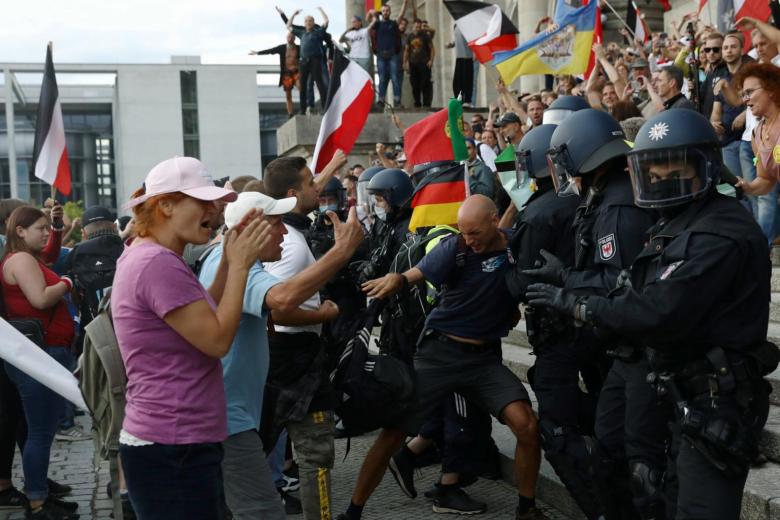BERLIN - Many Germans, including politicians and sociologists, are still struggling to make sense of what happened last Saturday (Aug 29), when a demonstration against government measures to combat Covid-19 descended into violence.
Some 38,000 people initially marched peacefully through the capital, Berlin, but when they reached the Reichstag, the German Parliament, a group of protesters tried to storm the building. A handful of courageous policemen, who were guarding the entrance, foiled the attempt.
Although the number of violent protesters was relatively small, the symbolism of their act stirred memories of a painful chapter in recent German history.
The building was the same site where the "Reichstag fire" occurred in January 1933, an event used by Adolf Hitler's Nazi Party as a pretext to suspend most civil liberties as well as democratic norms and to brutally hunt down members of the communist party.
After unification 30 years ago, Parliament returned to the building. The complex was renovated and - to signal as much political transparency as possible - a glass cupola was erected on top. Visitors can now walk around the dome and watch deputies at work in the chamber below.
Against this backdrop, many Germans were bewildered by the fact that the protesters last Saturday had accused the government of being dictatorial and undemocratic.
Condemned by almost all political parties, the protests ignited a debate over how to deal with an extremely unhomogeneous crowd.
A motley assortment of groups are coalescing in Germany following a civic initiative called "Querdenken" or lateral thinking. They range from ordinary citizens, who have suffered economically from the lockdown and denounce government measures against Covid-19 as excessive, to right-wing extremists, anti-vaxxers, conspiracy theorists to so-called "Reichsburgers" who reject the legitimacy of the modern German state and maintain that the German Reich continues to exist in its pre-World War II borders.
The Reichsburgers were the ones who initiated the rush to the Parliament building last Saturday.
Many protesters were carrying the "Reichsflagge", a former national flag in black, white and red in contrast to today's colours of black, red and gold. The Reichsflagge flew during the days of the old empire between 1871 and 1919 as well as during a transition period under the Nazis between 1933 and 1935 before they introduced the now infamous swastika.
Displaying such a flag on the steps of the Reichstag was another severe provocation. "It is an anti-democratic, a pre-democratic symbol," said Mr Matthias Quent, a sociologist and expert on right-wing extremism. "The flag stands for a clear rejection of the liberal, parliamentary democracy," he added.
While politicians are mulling over whether access to the Parliament building should be tightened to prevent a repeat of last Saturday's incident, a bigger debate has broken out on the responsibilities of the protesters.
A number of questions have been thrown up. Can peaceful demonstrators in fact march alongside extremists, believing that they do not have anything to do with them? Is it enough to afterwards simply distance oneself from violent acts of others?
In a statement earlier this week, Germany's President Frank-Walter Steinmeier said: "Anyone who seeks solidarity with right-wing extremists on the streets, but also anyone who only runs indifferently alongside neo-Nazis, xenophobes and anti-Semites, anyone who does not clearly and actively demarcate himself from them, is joining them."
Mr Kevin Kuhnert, deputy chairman of the Social Democratic Party, said it was not necessary to pay too much attention to the protesters. "We should not turn to those who shout the loudest."
No doubt he was referring to the fact that a vocal minority is dominating the headlines even though the overwhelming majority of Germans is supportive of how the government has handled the pandemic so far.
It is true that hundreds of thousands in Germany have either lost their jobs or their businesses but people are also receiving substantial financial support from the government.
Billions of euros were made available to help those in need. As a result, German domestic debt will rise significantly over the next few years.
Dr Ivan Krastev, one of the most prominent political scientists in Europe, foresaw the kinds of protests seen last Saturday, calling them the "paradox of Covid-19".
He argued that the early stages of the pandemic would foster a state of national unity, but the political, economic and social divisions that were already manifest before would be reinforced later.
"Memories of the pandemic itself will also fade like traces in the sand," he said. "The paradox is that the countries that either fought the virus very efficiently or were lucky enough to be spared will be the places where public opinion will be particularly critical of the government for its lockdown policy."
In combination with the networking opportunities provided by social media, otherwise unconnected groups can organise themselves and stage protests like the one in Berlin last week.
"Social media is reinforcing the 'confirmation bias', the reflex to always seek information that confirms our world view. Moreover, research shows that people leave group discussions with like-minded people more radicalised than before because their opinions and self-esteem have been confirmed," said Dr Julia Becker, social psychologist at the University of Osnabruck.
In an interview with the Berlin daily Der Tagesspiegel, she added that many of the protesters were "people, whom I would call 'libertarian egoists' who put their own freedom above the needs of other people. They are immune to arguments".












